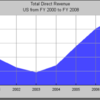Republicans Reject the Republican Offer on Deficit Cutting Mix, or Democrats Propose the AEI Plan on Tax Increases vs Spending Cuts

So if you opened the Republican economic study that their whole argument is based on, you would find that they recommend 15% tax increases, 85% spending cuts. There’s even a chart! Remember, the Democrats are proposing…..17% tax increases, 83% spending cuts, and getting rejected.
What would we propose as right-wing economists? Checking out their reports proposing this move, we’d proposed 85% spending cuts, 15% tax increases, exactly what the Democrats are proposing.
So once again, just like in the government shutdown debate, Obama and the Democrats are fighting to get what the Republicans and the right-wing economic think tanks originally proposed they should do, and the GOP just keeps walking the goalposts to the right. If this comes down to the constitutional option, I hope everyone remembers that the Democrats have actually proposed doing exactly what the Republicans and the right-wing economists originally asked for.
http://rortybomb.wordpress.com...es-vs-spending-cuts/
Is the GOP Deliberately Sabotaging the Economic Recovery?
It sure looks that way to me.
Given that they’re holding the debt ceiling vote hostage unless there is a deal on the debt and deficit, it’s pretty obvious to me they’re willing to tank the economic recovery for their own ideology and for political purposes. After all,Sen.McConnellsaid his number one legislative priority was to make Obama a one term president. If they can reverse the recovery, that would certainly make his re-election more difficult.
But I think its important for the American people to understand just what those revenue increasesARE that were on the table that caused Cantor and Kyle to walk out of the negotiation. The revenue increases the GOP characterize as “job killers;”
There are 180 tax expenditures* in the tax code used by 2 percent of the American people with the highest incomes. The top 400 highest income earners in the United States pay an average of 16 percent income tax. Even though these tax expenditures are actually GOVERNMENT SPENDING, eliminating or cutting ANY of them is what the GOP now calls “job-killing tax hikes.”
If we got rid of all those tax expenditures, at $100 billion a year, that’s $1 trillion in ten years. $80 billion per year could be put to deficit reduction, and the rest of could be used to reduce tax rates accross the board and broaden the tax base. IF they were really serious about reducing the deficit.
It appears the GOP is willing to tank the economy again, lose 642k more jobs, freeze credit once more for small business, make everyone’s mortgage cost more, increase interest on the debt by $75 Billion a year, ALLbecause they don’t think those top 400 income earners paying 10% less in taxes than those Americans making $34,500 should be asked to share in the sacrifice to get this nation back on sound fiscal standing.
* A tax expenditure program is government spending through the tax code. Tax expenditures alter the horizontal and vertical equity of the basic tax system by allowing exemptions, deductions, or credits to select groups or specific activities. For example, two people who earn the exact same income can have different effective tax rates if one of the tax payers qualifies for certain tax expenditure programs by owning a home, having children, and receiving employer health care and pension insurance. Tax expenditures have the same effect on the budget deficit as appropriations spending. A new tax expenditure program that costs the government $500 million dollars in revenues has the same effect on the national debt as an expansion of Social Security of $500 million dollars.
http://en.wikipedia.org/wiki/Tax_expenditure
Happy Independence Day everyone! So much for “LibertyANDJustice (fairness) for All”
Shame on them.




